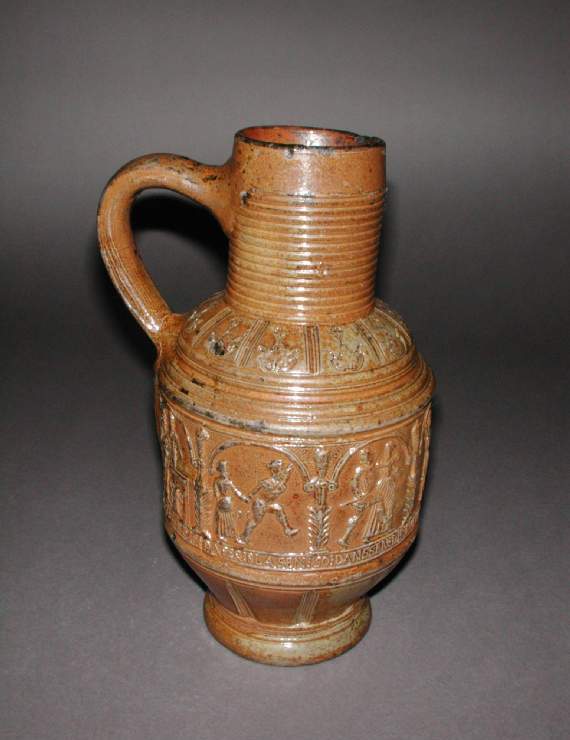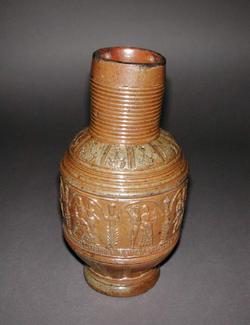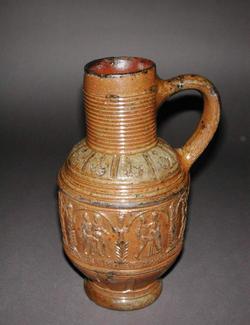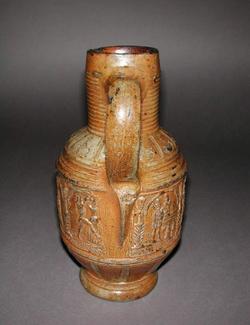Current Location: Gallery 27 (Glaisher)
Titles
Dancing Peasants Jug
Maker(s)
Potter:
Unidentified Raeren potter
Entities
Categories
Description
Grey stoneware with applied moulded reliefs, pale brown wash, and salt-glaze. The jug has a cylindrical reeded neck, a domed shoulder, a loop handle, a cylindrical middle, contracting below into a low rounded foot. The middle is decorated with a frieze in relief of peasants dancing in arcaded compartments: below is a band with the following inscription in relief: 'GERHET DV MVS DAPER BLASEN SO DANSSEN DIE BVREN ALS WEREN SI RASEN ERS VFSPRICHT BASTOR ICH VER DA . . .’ (Gerard you must blow mightily/bravely; the boors dance as if they were mad; up speaks the pastor, I d [ance away my cowl and surplus]. In the compartment on the extreme left are the initials and date ‘T .K./1598’; in the next the intials, ‘D.I.’; and on the extreme right, ‘KAP’ (cowl; ending of the first inscription). Below, the body is divided into panels by vertical bands, and on the shoulder there are ten panels containing leaf motifs.
Notes
History note: William Mullins, 52 High Street, Salisbury, where seen on 17 July 1922, and purchased by letter on 16 August with three more pieces of stoneware for £24 by Dr J.W.L. Glaisher, FRS, Trinity College, Cambridge. The jug arrived in Cambridge on 24 August 1922
Legal notes
Dr J.W.L. Glaisher Bequest
Measurements and weight
Height: 25 cm
Width: 17 cm
Acquisition and important dates
Method of acquisition: Bequeathed
(1928-12-07)
by
Glaisher, J. W. L., Dr
Dating
16th Century, Late
Renaissance
Production date:
circa
AD 1598
Note
Raeren was situated in Germany until after the First World War, when it became part of Belgium,and its stoneware is usually classified as German. Baluster-shaped jugs with cylindrical necks decorated on their side with either a continuous frieze or compartments enclosing dancing peasants were one of the typical products of Raeren potters. The band of dancing figures on this example were derived from 'Das Bauernfest '(The Peasant Festival) series of prints by Hans Sebald Beham (1500-50), published in Nuremberg in 1546/7. The inscription here which lacks its ending occurs with variations on many of the jugs. A comparable jug with peasants dancing within arched compartments, and with further moulded decoration on its neck, dated 1596, is in the Victoria and Albert Museum, inv. no. 1941-1855.
School or Style
Renaissance
People, subjects and objects depicted
Components of the work
Surface
composed of
slip
( pale brown)
salt-glaze
Base
Diameter 8.9 cm
Reliefs
Materials used in production
grey
Stoneware
Techniques used in production
Salt-glazing
Inscription or legends present
- Text: GERHET CV MVSDAPER BLASEN SO DANSSEN DIE BVREN ALS WEREN SI RASEN ERS VF SPRICHT BASTOR ICH VER DA...
- Location: On exterior below figures
- Method of creation: Moulded in relief
- Type: Inscription
References and bibliographic entries
Identification numbers
Accession number: C.2034-1928
Primary reference Number: 73032
Old object number: 3886
Stable URI
Audit data
Created: Saturday 6 August 2011
Updated: Wednesday 12 February 2025
Last processed: Tuesday 15 July 2025
Associated departments & institutions
Owner or interested party:
The Fitzwilliam Museum
Associated department:
Applied Arts







